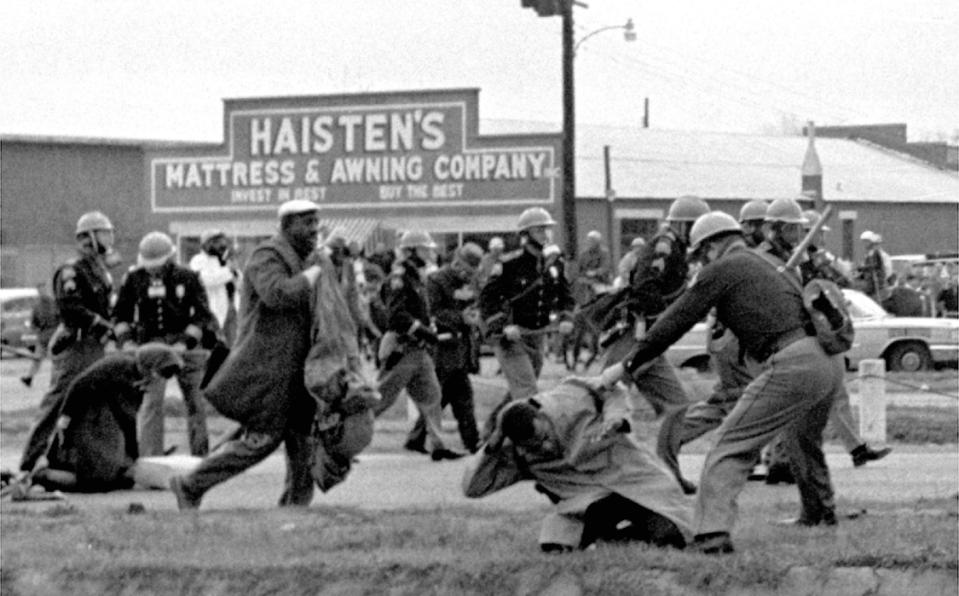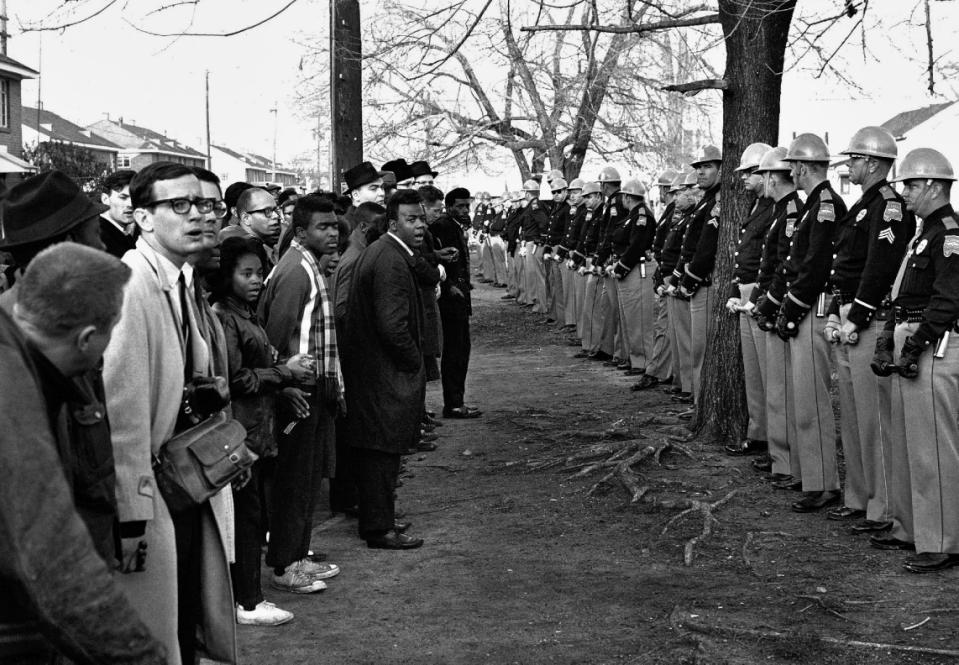THE MEANING OF SELMA
A Repubished Article
By Romeo A. Cherot, March 9, 1965
Special for THE NEW TIMES HOLLER!
by
© Amir Bey, 2015,
March 6, 2015
The Continuing Struggle Correspondence
|
As we approach the 50th Anniversary of the Marches on Selma, and the March 7 “Bloody Sunday,” where police beat, tear gassed and hosed peaceful demonstrators, let us reflect not only on those fateful horrors that led to the Voting Rights Act of 1965. In 2015 we find ourselves faced with the same injustices:
police still threaten African Americans as they go about their daily lives, and the voting rights of Blacks - I like both terms! - are under siege through laws instituted by the Republican Party that hinder them from exercising them. The parallels existing between those painful times and now are evidence of the depth of America’s unresolved racial problems,
which should come as no surprise because they were woven into this country’s fabric since its inception.
The following is a correspondence from Romeo A. Cherot, who was an editor and journalist for Radio Free Europe dated March 9, 1965,
written two days after “Bloody Sunday.” While reading it, I was struck by how primitive a state we were and are still in that basic rights
that should be inalienable are still must be fought for. Social evolution is a slow process it seems!
|
BLOODY SUNDAY
Unequal Combat

This was the scene at Selma, Alabama on March 7, 1965.
|
| CONFRONTATION
|
"The People, United, Will Never Be Defeated..."
Equal Combat

|
The Meaning of Selma
New York, March 9, (Radio Free Europe Special/ DIP Correspondence Romeo Cherot)
Selma, Alabama, is currently the center of a long struggle to make the right to vote a reality for Negroes in the Deep South. Under the leadership of the Reverend Martin Luther King, Negroes are conducting an intensive drive there to register in order to vote.
The drive, which has been in the national and international spotlight since it began in early January, came into even sharper focus Sunday when a group of Negroes marching to the state capital of Montgomery was brutally beaten by state police, and forced back to Selma. Dr. King, accompanied by Americans in various walks of life from other parts of the country, is organizing a second march to Montgomery Tuesday.
The hundreds of clergymen, representatives of Civil Rights groups and concerned laymen from other parts of the U.S. answered Dr. King’s call for people of all faiths from all parts of the country to join him on the 50-mile protest march to the Alabama capital.
However, that planned march temporarily hit a snag Tuesday when a federal judge ordered the Negroes to delay it pending a further court hearing Thursday.
After the elections last November, Dr. King’s South Christian Leadership Conference decided that the most immediate need of Negroes was full voting rights in the Black Belt. It was noted that in the November elections President Johnson had carried six of the eleven southern states largely on a margin provided by the Negro vote.
State and Local Police Against the People
Selma was chosen as a focal point of the campaign because it is the unofficial capital of the Black Belt (so-called because of its black soil and heavy Negro population) and a stronghold of resistance to the Civil Rights movement. In Dallas County, where Selma is located, the Board of Registrars over the years has used various devices that have had the effect of keeping down Negro voters. Although over 50 % of the 28,000 is Negro, only 335 Negroes were registered when the current drive began.
In Alabama, 370,000 Negroes of voting age are not registered. Probably the bulk of these live in the Black Belt. Negro leaders say if they were registered officials like Sheriff Clark and Governor Wallace would be eliminated and Negroes would gain a voice in state and local governments.
By the end of 1964, Selma was rife for a full-scale Civil-Rights movement. Negroes who had been forced to succumb to Sheriff Clark’s pressure in 1963 were anxious to express their resentment. Even middle-class Negroes, who usually remain aloof of the movement, were enlisted in the campaign.
At the same time a new leadership had emerged in Selma, committed to a reluctant compliance with the 1964 Civil Rights Law and a policy of making minimum change necessary to preserve the peace and reputation of the community. But the county police force led by Sheriff Clark, and the state police with the direction and approval of Governor George Wallace, have directly frustrated this aim and brought the situation to its current crisis stage.
The courts have been active in assisting voter registration by ordering a speedup of registration, and in easing of the restrictive registration tests. The administration is preparing strong voting rights laws. President Johnson has strongly denounced the infringement of voting rights in Alabama. Thus Dr. King has succeeded in bringing Selma to the attention of the nation.
Selma is a preview of the Civil Rights story this spring and summer: mass demonstrations in a host of small towns with unfamiliar names. The reason is that the main Civil Rights struggle has shifted out of the big cities and into the small towns.
No one would argue that integration is complete in such noted battlefields as Birmingham, Alabama, or Jackson, Mississippi, but the law is widely accepted in these cities, and easily enforced by federal courts. The trappings of segregation – for example, the degrading “White” and “Colored” signs in washrooms – have disappeared from public buildings, restaurants, hotels, even public schools have peacefully integrated.
The People United…
The story is considerably different off the beaten path. The Black Belt has never even recognized the “separate but equal” doctrine, let alone integration. There is no federal presence for support, and sheer fear makes negroes passive, unwilling to even attempt to enforce the provisions of last year’s sweeping Civil Rights Law.
The prospects of these rural areas are so tough that the Civil Rights leadership had adopted only the limited goal of voter registration (though in the long run, this may turn out to be the most important breakthrough of all). The right to vote is so deeply embedded in the American character that even the staunchest of segregationist may feel a twinge of conscience when he argues against Negroes voting.
Nationally read columnist Roscoe Drummond, writing recently about the Selma situation, perhaps sums up best its meaning, for the south as well as the nation. He says:
The last-ditch opponents of Negro voting rights are not only fighting a losing battle; they are doing the most to bring about the very thing they say they don’t want: further extension of federal power to enforce Civil Rights Law.
|
THE VANGUARD |
VICTORY BRIGADE MARCHES AT SELMA

|
The states do not have the constitutional right to apply these qualifications one way to white citizens and another way to Negro citizens.
This is what they are doing in Selma, Alabama, and in some other areas. In doing so, it is the advocates of states’ rights who are inviting further loss of states’ rights.
Neither the President nor Congress is eager to have the Federal Government take control of the registration of citizens who are being denied their rights. This is what is going to happen if, as in Selma, Negroes who want to vote are taken to jail instead of the Registrar’s office…
The question is no longer whether this right to vote is going to be attained by all citizens – but how soon.
It is clear that the country, the Congress, and the courts are determined to secure this right to all eligible Negro citizens faithfully and steadily.
This is a constitutional right for all Americans wherever they live in the U.S. It is explicit and unarguable. It is the duty of the courts and of Congress to protect this right.
Every time local authorities try to misuse state power to deny a citizen his vote, they are inviting congress to authorize federal registrars to go anywhere they are needed to protect this right…
|
|
ROMEO A. CHEROT

|
|
|
|
|
|